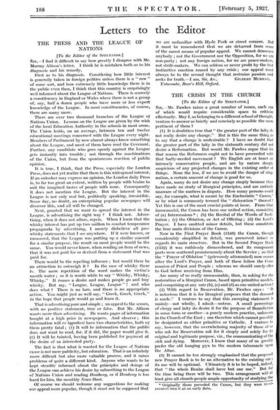Letters to the Editor.
THE PRESS AND THE LEAGUE OF NATIONS [To the Editor of the SPECTATOR.]
find it difficult to say how greatly I disagree with Mr. Murray Allison's letter. I think he is mistaken both as to his diagnosis and his remedy.
First as to his diagnosis. Considering how little interest is generally taken in foreign politics unless there is a " row " of some sort, and how extremely little knowledge there is in the public even then, I think that this country is surprisingly well informed about the League of Nations. There is scarcely A constituency in England or Wales where there is not a group of, say, half a dozen people who have more or less expert knowledge of the League. In most constituencies, of course, there are many more.
There are over two thousand branches of the League of Nations Union. Lessons on the League are given by the wish of the local Education Authority in the schools in most areas. The Union holds, on an average, between ten and twelve educational meetings concerned with the League every night. Members of Parliament by now almost always know something about the League, and most of them have read the Covenant. Further, any candidate who goes openly against the League gets instantly into trouble ; not through the machinations of the Union, but from the spontaneous reaction of public opinion.
It is true, I think, that the Press, especially the London Press, does not yet realize that there is this widespread interest. If an onlooker may express an opinion, the London daily Press is, to far too great an extent, written by people with brains to suit the imagined tastes of people with none. Consequently it does not mention the League. But the interest in the League is not only real but, politically speaking, irresistible. Some day, no doubt, an enterprising popular newspaper will discover this, and all will be changed.
Next, granted that we want to spread the interest in the League, is advertising the right way ? I think not. Adver- tising, when it does not allure, repels. When I learn that the whisky interest has put up two million to combat temperance propaganda by advertising, I merely disbelieve all pro- whisky statements that I see anywhere. If it were known, or rumoured, that the League was putting up a similar amount for a similar purpose, the result on most people would be the same. You would never know, when reading an item of news, that it was not paid for or derived from a statement that was. paid for.
There would be the repelling influence ; but would there be an attraction to outweigh it ? In the case of whisky there is. The mere repetition of the word makes the victim's mouth water ; so it is worth while to say "Whisky, Whisky, Whisky." It rouses a desire and makes people go and buy whisky. But say, "League, League, League " ! and who does what ? There is no lure, and there is no appropriate action. You might just as well say, "Greek, Greek, Greek," in the hope that people would go and learn it.
That is advertising pure and simple ; an appeal to the senses, with no positive statement, true or false. But Mr. Allison
wants more than advertising. He wants pages of information bought at a high price in newspapers. And observe ; this information will ex hypothesi have two characteristics, both of them pretty fatal ; (1) It will be information that the public does not want to read, for, if it did, the paper would give it. (2) It will be tainted, having been published for payment at the desire of an interested party.
. The fact is that what is wanted for the League of Nations
cause is not mere publicity, but education. That is an infinitely more difficult but also more valuable process, and it raises Problems of quite a different kind. Anyone who wants to be kept steadily informed about the principles and doings of the League can achieve his desire by subscribing to the League of Nations Union and reading Headway, or if Headway is too hard for him, the mouthly News Sheet.
_Of course we should welcome any suggestions for making our appeal more popular, though it must not be supposed that we are unfamiliar with Hyde Park or street corners. But it must be remembered that we are debarred from some of the surest means of popular appeal. We cannot denounce anybody ; not the Government nor the Opposition, for we are non-party ; not any foreign nation, for we are peace-makers, not strife-makers. We can seldom or never profit by the first instinctive emotion roused by any crisis ; our appeal must always be to the second thought that restrains passion and
seeks for truth.—! am, Sir, 8re., GILBERT MURRAY. Yatscombe, Boar's Hill, Orford.


























































 Previous page
Previous page